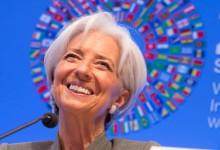
Typical street scene in Santa Ana, El Salvador. (Photo: iStock)
IMF Survey : Lift Tomorrow’s Growth For Better Economic Future—Lagarde
April 16, 2015
- Global recovery continues, but growth is moderate, uneven
- Current global growth not enough to boost jobs and incomes, cut poverty
- Lift today’s growth and tomorrow’s growth, and work together
Current growth in the global economy is simply not good enough to reduce high unemployment, bolster middle-class incomes, and drive poverty reduction, IMF Managing Director Christine Lagarde said.

IMF’s Christine Lagarde: ‘Potential growth rates are going down … we need to lift the rate at which economies can grow over the medium term’ (IMF photo)
2015 IMF–WORLD BANK SPRING MEETINGS
Speaking at a news conference ahead of the 2015 IMF–World Bank Spring Meetings in Washington, she said a better economic future depended on lifting today’s growth, lifting tomorrow’s growth, and working together.
Lagarde noted that the IMF’s updated forecasts project the global economy to grow this year at 3.5 percent—about the same rate as last year—and to grow slightly faster at 3.8 percent next year.
“So the good news is that the global recovery continues. The not-so-good news is that growth remains moderate and uneven,” Lagarde told reporters. Participants at the Spring Meetings would be discussing how to prevent this “new mediocre” becoming the “new reality,” she stated.
“To get it good, it needs to get better,” Lagarde declared. Policymakers could start by lifting today’s growth, Lagarde said. Measures should include
• A package of demand-support policies that is tailored to specific situations and includes accommodative monetary policy where it is needed, tightening of monetary policy where it is possible, and smart fiscal policies;
• Addressing financial stability risks emanating from super-low interest rates, volatile commodity prices and exchange rates, and the potential rise in U.S. short-term interest rates; and
• Stronger financial policies to tackle financial risks that are rising and rotating—from advanced economies to emerging markets, from banks to the nonbank financial sector, and from sovereign solvency to market liquidity.
Lifting today’s growth is not enough, Lagarde stated. “We also need to lift the rate at which economies can grow over the medium term. Potential growth rates are going down, and this is in part because of changing demographics, lower productivity and, in some countries, the legacy of the crisis.”
Strong leadership
Reversing this trend means making serious structural reforms that encompass labor and product markets, infrastructure, trade, and investments in people. Implementing these reforms will call for strong leadership, Lagarde said.
Lagarde stressed that lifting today’s growth and tomorrow’s growth requires working together. International collaboration is also essential for making growth more sustainable and more inclusive.
“We need to continue reforming the international monetary system to make it more resilient, including efforts to better integrate fast-growing emerging markets,” Lagarde stated.
Lagarde said 2015 would be a special year for development when global attention is focused on three critical issues: financing for development, the new Sustainable Development Goals, and climate change.
Global Policy Agenda
Lagarde highlighted the Global Policy Agenda, which will be discussed (see box) with the IMF’s policy-setting body, the International Monetary and Financial Committee during the Spring Meetings. She said the Agenda outlined the strategic direction of the IMF’s work over the next 12 months.
Integrated policy package required
Lifting today’s growth, fortifying tomorrow’s prospects, and working together for the future are the collective goals targeted by the Global Policy Agenda that will be presented to senior officials by IMF Chief Christine Lagarde at the 2015 Spring Meetings.
The Global Policy Agenda, which will be discussed with the IMF’s policy-setting body—the International Monetary and Financial Committee—at its meeting on April 18, outlines policy priorities for the IMF’s 188 members and what the Fund can do to assist. It also offers a progress report on goals discussed by the membership and the Fund at the 2014 Annual Meetings in Washington.
The report says promoting balanced, sustained growth requires an integrated policy package that bolsters today’s actual and tomorrow’s potential output, diminishes risks, and confronts emerging global challenges. It adds that the year 2015, anchored by three major international conferences, marks an unprecedented opportunity for the world to chart the course for sustainable development for the next decade and beyond.
Read the Global Policy Agenda


